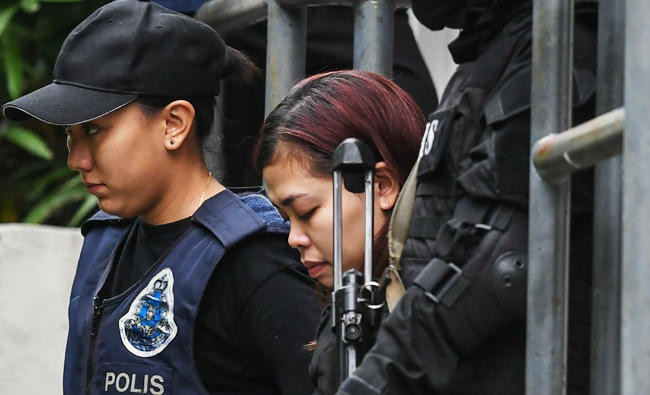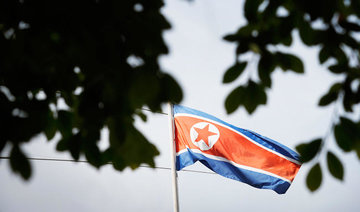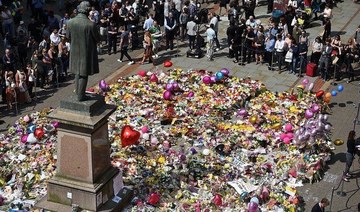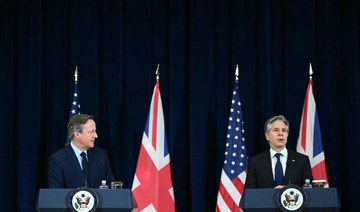KUALA LUMPUR, Malaysia: The trial of two women accused of poisoning the estranged half brother of North Korea’s ruler is scheduled to begin Monday in Malaysia’s High Court, nearly eight months after the brazen airport assassination.
Siti Aisyah of Indonesia and Doan Thi Huong of Vietnam are suspected of smearing Kim Jong Nam’s face with the banned VX nerve agent on Feb. 13 at a crowded airport terminal in Kuala Lumpur, killing him within about 20 minutes. The women say they thought they were playing a harmless prank for a hidden-camera show.
The women are the only suspects in custody in a killing that South Korea’s spy agency said was part of a five-year plot by North Korean leader Kim Jong Un to kill a brother he reportedly never met. Police say several North Koreans suspected of involvement left the country on the day of the attack and others were allowed to leave later in a diplomatic deal with Pyongyang.
The two women, who face the death penalty if convicted, will plead not guilty at the start of the trial, their lawyers said.
Prosecutors will then start to call their witnesses, with the first few likely to be medical experts to establish the cause of death, said Hisyam Teh Poh Teik, Huong’s lawyer. The trial is expected to last for about two months, after which the judge will decide if there is a strong case for the women to have to mount their defense, Teh said.
Kim, who was 45 or 46, was the eldest son of the family that has ruled North Korea since its founding, yet he reportedly fell out of favor in 2001 when he was caught trying to enter Japan on a false passport, saying he wanted to visit Tokyo Disneyland. He had been living abroad for years and at the time of his death was traveling on a North Korean diplomatic passport under the name “Kim Chol.”
North Korea has a long history of ordering killings of people it views as threats to its regime, though Kim was not thought to be seeking influence over his younger brother. He had, however, spoken out publicly against his family’s dynastic control of the reclusive, nuclear-armed nation.
Pyongyang has denied any role in the killing and has not even acknowledged the dead man was Kim Jong Nam. It has suggested the victim died of a heart attack and accused Malaysia of working with South Korean and other “hostile forces” in blaming Pyongyang.
The trial will be closely watched by the Indonesian and Vietnamese governments, which have hired lawyers to defend the women.
Aisyah’s core defense will be that she didn’t know she had poison on her hand when she smeared Kim’s face and was instead the victim of an elaborate trick, her lawyer Gooi Soon Seng said. The 25-year-old was at a pub in Kuala Lumpur in early January when she was recruited by a North Korean man to star in what he said were video prank shows, Gooi said.
Over the course of several days, the North Korean, who went by the name James, had Aisyah go out to malls, hotels and airports and rub oil or pepper sauce on strangers, which he would film on his phone, the lawyer said.
Aisyah was paid $100-$200 for each prank and hoped the income would allow her to stop working as an escort, Gooi said.
In late January, Aisyah flew to Cambodia, where James introduced her to a man called Chang, who said he was the producer of video prank shows for the Chinese market, the lawyer said. Back in Malaysia, Chang asked Aisyah to do several more pranks at the Kuala Lumpur airport a few days before Kim was attacked. At the airport on the day of Kim’s death, Chang pointed him out to Aisyah as the next target and put the poison on her hand, the lawyer said.
Police say neither Chang nor James were who they say they were. Chang was actually Hong Song Hac, one of four North Korean suspects who left Malaysia on the day of the killing, while James was Ri Ji U, one of another three North Koreans who hid inside their country’s embassy in Kuala Lumpur to avoid questioning.
Those three were later allowed to fly home in exchange for nine Malaysians allowed to leave Pyongyang in a deal easing the countries’ diplomatic tensions. Gooi said James was key to Aisyah’s defense and that his absence could weaken her case.
Aisyah, who has a son, has wrote to her family and told them to pray for her “so that the case will be over soon and I can go back home.”
The 29-year-old Vietnamese suspect Huong was caught on airport security surveillance camera wearing a white sweatshirt emblazoned with the big black letters “LOL” — the acronym for laughing out loud. Little is known about her. Raised in a rice farm in northern Vietnam, her family said they had hardly heard from her since she left home a decade ago.
She made postings on a Facebook page under the name Ruby Ruby, according to her niece, Dinh Thi Quyen.
Photos on the page show Huong wearing a white shirt that says “LOL,” like the one seen during the attack. It shows her posing for selfies in January in Cambodia and in Kuala Lumpur a few days before the attack.
Her last post was on the morning of Feb. 11, two days before the attack, from an area near the airport.
Trial to begin in assassination of N. Korea leader’s brother
Trial to begin in assassination of N. Korea leader’s brother

Black, Asian and minority ethnic people make up nearly 70% of UK’s anti-terror detentions, data shows

- Fewer than 1 in 5 who were stopped were recorded as white
LONDON: Nearly 70 percent of people stopped at UK ports under anti-terrorism laws since 2021 were from Black, Asian and minority ethnic backgrounds, new figures released on Sunday show.
The Guardian newspaper requested police data under freedom of information laws, which also revealed fewer than one in five who were stopped were recorded as white.
Campaigners have criticized the statistics, saying they prove the UK’s anti-terrorism laws are disproportionately affecting Black and minority ethnic groups and not being used effectively enough to arrest the rise of far-right, white extremism, The Guardian reported.
Of the 8,095 people stopped at UK ports since 2021 under Schedule 7 of the Terrorism Act 2000, 5,619 (69.4 percent) were recorded as being from Black, Asian and minority ethnic backgrounds, compared with 1,585 (19.6 percent) recorded as white British, white Irish or white other stopped under the same law.
The head of public advocacy at the anti-Islamophobia group Cage International has also pressed British police to publish data on the religious background of those stopped under the Terrorism Act.
Anas Mustapha said: “This new data reaffirms what we already know about its racist and Islamophobic impact. However, despite evidence demonstrating that the majority of those stopped are Muslim and that forces record data on religion, the government has resisted calls to produce a religious breakdown of those harassed at the borders.
“Schedule 7 is one of the most intrusive and discriminatory of all police powers. We’ve supported hundreds of British holidaymakers impacted by the policy and it’s clear that the power is abused and must be repealed.”
A spokesman from the UK’s counter-terrorism police said the law was a “vital tool” in collecting evidence to support convictions of terrorists, as well as helping with intelligence-gathering in the prevention of attacks on British streets.
“The use of Schedule 7 powers regularly features in some of our most complex and high-risk investigations and prosecutions,” the spokesman said.
“We face an enduring terrorist threat from overseas, and whilst we are seeing a much greater prevalence of online activity, travel remains an element of terrorist methodology that provides us with potentially crucial opportunities to act.
“Where the powers are used, there are a range of robust safeguards and measures in place to ensure appropriate usage.”
OIC calls for immediate aid amid Afghan flood crisis

- Flash floods from seasonal rains in Baghlan province in northern Afghanistan
RIYADH: The Organization of Islamic Cooperation has issued an urgent appeal to its member states as well as relief organizations to provide aid to the Afghan people amid catastrophic flooding which has hit the country, Saudi Press Agency reported on Sunday.
Flash floods from seasonal rains in Baghlan province in northern Afghanistan killed at least 315 people since striking on Friday, a UN report said.
Rains also caused heavy damage in northeastern Badakhshan province and central Ghor province, officials said.
Since mid-April, floods have left about 100 people dead in 10 of Afghanistan’s provinces, with no region entirely spared, according to authorities.
Farmland has been swamped in a country where 80 percent of the more than 40 million people depend on agriculture to survive.
UK investigating Hamas’ claim that British hostage killed in Gaza

- Foreign secretary confirms viewing video
LONDON: The UK’s Foreign Office said on Sunday it was investigating a claim by Hamas that a British-Israeli hostage in Gaza had died from injuries sustained in an Israeli airstrike over a month ago.
Nadav Popplewell, 51, was captured along with his mother Channah Peri on Oct. 7 during a border incursion when the Palestinian group launched a surprise attack on Israel.
The Foreign Office said it was actively seeking more information on the matter.
Popplewell’s family has requested media outlets refrain from airing footage released by Hamas, showing him in captivity with visible injuries, the BBC reported.
The UK’s Foreign Secretary David Cameron, speaking to the BBC’s Laura Kuenssberg, confirmed viewing the video but provided no further updates on the investigation.
Cameron said: “We don’t want to say anything until we have better information.”
He described Hamas as “callous” for releasing the video and playing “with the family’s emotions in that way.”
The Foreign Office added that the department’s thoughts “are with his family at this extremely distressing time.”
The Israeli military has not issued a statement on the matter.
Israel’s military campaign in Gaza to destroy Hamas has killed over 34,900 people, the majority of whom are women and children, according to the Gaza Health Ministry.
Israel has reported that 128 hostages are unaccounted for.
UK mountaineer logs most Everest climbs by a foreigner, Nepali makes 29th ascent

- Both climbers used Southeast Ridge route to summit
- They were on separate expeditions guiding their clients
KATMANDU: A British climber and a Nepali guide have broken their own records for most climbs of Mount Everest, the world’s highest mountain, hiking officials said on Sunday.
Rakesh Gurung, director of Nepal’s Department of Tourism, said Britain’s Kenton Cool, 50, and Nepali guide Kami Rita Sherpa, 54, climbed the 8,849-meter (29,032 foot) peak for the 18th and 29th time, respectively.
They were on separate expeditions guiding their clients.
“He just keeps going and going... amazing guy!” Garrett Madison of the US-based expedition organizing company Madison Mountaineering said of the Nepali climber. Madison had teamed up with Kami Rita to climb the summits of Everest, Lhotse, and K2 in 2014.
K2, located in Pakistan, is the world’s second-highest mountain and Lhotse in Nepal is the fourth-tallest.
Lukas Furtenbach of the Austrian expedition operator Furtenbach Adventures called Cool’s feat remarkable.
“He is a fundamental part of the Everest guiding industry. Kenton Cool is an institution,” Furtenbach, who is leading an expedition from the Chinese side of Everest, told Reuters.
Both climbers used the Southeast Ridge route to the summit.
Pioneered by the first summiteers, New Zealander Sir Edmund Hillary and Sherpa Tenzing Norgay in 1953, the route remains the most popular path to the Everest summit.
Kami Rita first climbed Everest in 1994 and has done so almost every year since, except for three years when authorities closed the mountain for various reasons.
He climbed the mountain twice last year.
Mountain climbing is a major tourism activity and a source of income as well as employment for Nepal, home to eight of the world’s 14 tallest peaks, including Everest.
Nepal has issued 414 permits, each costing $11,000 to climbers for the climbing season that ends this month.
Banning UK arms exports to Israel would strengthen Hamas, UK’s Cameron says

- Cameron said he did not support an operation in Rafah in the absence of a plan to protect hundreds of thousands of civilians
LONDON: Stopping British arms sales to Israel if it launches a ground assault on Rafah in the Gaza Strip would strengthen Hamas, Britain’s Foreign Secretary David Cameron said on Sunday.
Israel ordered Palestinians to evacuate more of the southern city on Saturday in an indication it was pressing ahead with its plans for a ground attack, despite US President Joe Biden’s threat to withhold the supply of some weapons if it did so.
Cameron said he did not support an operation in Rafah in the absence of a plan to protect hundreds of thousands of civilians sheltering in the southern border city.
However, Britain was in a “completely different position” to the United States in terms of providing arms to Israel, he said, noting that the less than 1 percent of Israel’s weapons that came from Britain were already controlled by a strict licensing system.
“We could, if we chose to, make a sort of political message and say we are going to take that political step,” he told the BBC’s Laura Kuenssberg.
“The last time I was urged to do that (...), just a few days later there was a brutal attack by Iran on Israel, including 140 cruise missiles,” he added.
Cameron said the “better answer” would be for Hamas, which controls Gaza, to accept a hostage deal.
“Just to simply announce today we’re going to change our whole approach to arms exports rather than go through our careful process, it would strengthen Hamas, it would make a hostage deal less likely, I don’t think it would be the right approach,” he said.
Hamas attacked southern Israel on Oct. 7, killing some 1,200 people and taking more than 250 people hostage, according to Israeli tallies.
Israel’s military response in Gaza has killed close to 35,000 Palestinians, according to Gaza’s health ministry.



















